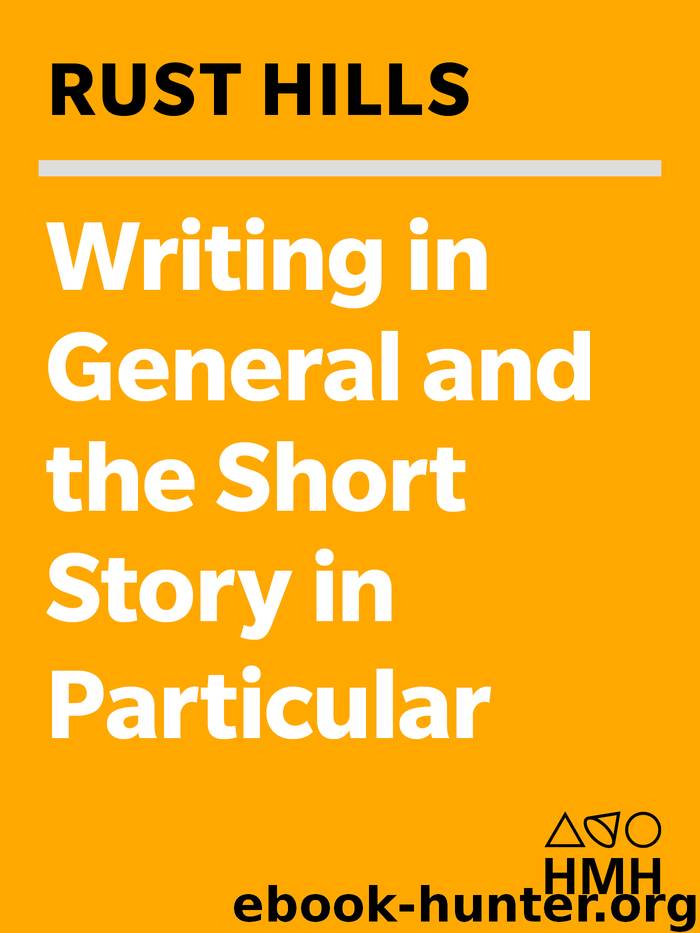Writing in General and the Short Story in Particular by Rust Hills

Author:Rust Hills
Language: eng
Format: epub
Publisher: Houghton Mifflin Harcourt
ACT I, Scene 1—Friday night. Miranda Sleezick’s one- room apartment on New York’s West Side
and hence it seemed to them necessary to drop into the dialogue the facts that it’s Friday night, and that it’s New York’s West Side, and probably even that it’s a one-room apartment. Everything that’s done in a play has to be done in dialogue, of course. But playwrights no longer use such corny old bits of exposition business as the gossipy cook explaining all about the family to a new serving maid as they set the table for a dinner party, or the monologue phone conversation in which the heroine explains her problems to her girl friend while purportedly asking her help.
The whole exposition business is outmoded now, even for the theater. Faced with a lot of exposition, a modern playwright is just as likely as not to have one of his characters step forward and tell the audience directly what it needs to know. And playwrights realize that the cost of seats being what it is, audiences nowadays have to stay in them through the first act at least, and that if an audience is a bit puzzled they’re more likely to pay close attention to what’s going on than if they’re given a lot of information in the beginning that they could easily infer as the action develops. A bit of puzzlement, in fact, as to just what’s happening and where, can often make a play seem, in the beginning, at least, rather better than it actually is—more “literary” and avant-garde certainly, but also more mysterious and suspenseful.
Deliberately withheld information, as a dramatic device, is at least as old as Oedipus Rex, but it was Ibsen who showed playwrights how to refine it almost to a formula: how to hold back any account of what happened years ago — a recounting of which no matter how artfully handled would have bored his audience in the beginning—until the very last act, creating great suspense, the absence of exposition becoming really an effective part of the plotting, so that the plot turns on the unrevealed information, so that when the explanation comes, it is not a part of the initiation, but actually achieves the resolution. Dramatists since have developed withholding information to a fine art, making a secret not only of what happened in the past but also of what’s happening on stage at the present; and in many successful modern plays — such at T. S. Eliot’s The Cocktail Party and Samuel Beckett’s Waiting for Godot, for instance—it’s never explained to the audience even at the end what the situation is, or was.
Thus the fiction writer need feel no real need to create a beginning for his story, an “initiation” into it. Let him launch right in and tell it, beginning as near the middle as possible. And if he does feel that the reader needs immediately to know certain facts about his characters, his locale, the situation—then let him recount these facts as
Download
This site does not store any files on its server. We only index and link to content provided by other sites. Please contact the content providers to delete copyright contents if any and email us, we'll remove relevant links or contents immediately.
| Anthropology | Archaeology |
| Philosophy | Politics & Government |
| Social Sciences | Sociology |
| Women's Studies |
Nudge - Improving Decisions about Health, Wealth, and Happiness by Thaler Sunstein(7190)
iGen by Jean M. Twenge(5125)
The Fire Next Time by James Baldwin(4986)
Adulting by Kelly Williams Brown(4197)
The Hacking of the American Mind by Robert H. Lustig(4051)
The Sports Rules Book by Human Kinetics(4042)
The Ethical Slut by Janet W. Hardy(4008)
Captivate by Vanessa Van Edwards(3698)
Mummy Knew by Lisa James(3495)
In a Sunburned Country by Bill Bryson(3331)
The Worm at the Core by Sheldon Solomon(3293)
Ants Among Elephants by Sujatha Gidla(3260)
Suicide: A Study in Sociology by Emile Durkheim(2885)
The Slow Fix: Solve Problems, Work Smarter, and Live Better In a World Addicted to Speed by Carl Honore(2818)
The 48 laws of power by Robert Greene & Joost Elffers(2739)
Humans of New York by Brandon Stanton(2661)
Handbook of Forensic Sociology and Psychology by Stephen J. Morewitz & Mark L. Goldstein(2588)
The Happy Hooker by Xaviera Hollander(2559)
The Tipping Point by Malcolm Gladwell(2527)
